The 20th edition of my Polaroid Diaries is dedicated to Gothenburg, Sweden. I visited Gothenburg off-season, and I must admit I had luck with the weather. In terms of temperature, it still felt like winter; however, the days were mostly sunny. After walking around the city for a few days, I decided to dedicate this diary to Gothenburg statues and architecture. Despite its compact size, the city often feels like an outdoor gallery.
On the other hand, shooting travel photography with a polaroid camera is challenging: you depend greatly on the light in your destination. Traveling north often translates to darker days. But when I saw the weather forecast for Gothenburg, I decided to pack my Polaroid SX-70 and one film and see what I could photograph.
However, I regretted having only one SX-70 film with me. Gothenburg is Sweden’s second biggest city and has plenty of attractions. Moreover, after discovering the number of statues Gothenburg has, I became desperate to shoot each of them. Of course, this is an exaggeration, but give light and clear skies to an analog photographer and see what happens.
On a side note, since this is the 20th edition of the Polaroid Diaries, I thought of shooting it with the SX-70. It’s my favorite polaroid camera, and reaching that milestone meant a lot. Hence, the way to celebrate it was to shoot a film with SX-70 and see what I could get.
*Some of the links are affiliate links. It means that if you buy something, I might earn a small commission at no additional cost to you.
What you’ll see in the Polaroid Diaries: Gothenburg statues & architecture
In this edition of the Polaroid Diaries, you will see the 8 photos I shot with the SX-70 while traveling to Gothenburg. The Swedish city was a pleasure to walk around, and the pleasant weather helped me enjoy it. However, the light seemed quite harsh, and -believe it or not- I found it more challenging to shoot polaroids compared to Tuscany.
Before starting with the Gothenburg polaroids, I’d like to mention that you’ll also find the settings I used for this diary at the bottom of this post. And, if you want to plan a visit to Gothenburg, I’ll also link to my other articles about the city.
So, let’s start now with the polaroids from Gothenburg with the SX-70.
Polaroid Diaries: Gothenburg statues & architecture
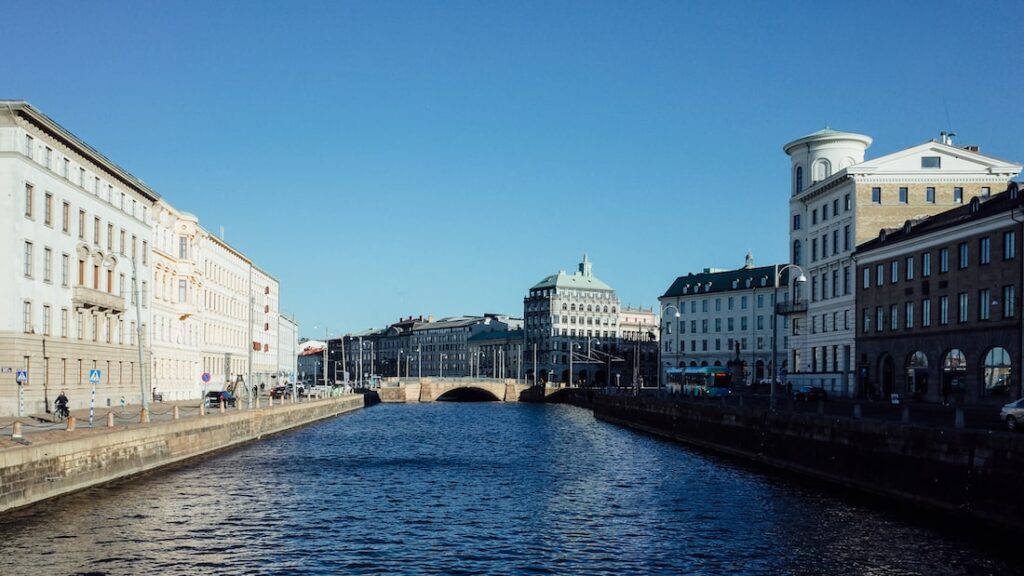
It doesn’t matter where in Gothenburg will be your starting point. Sooner than later, you’ll come across a statue, and the chances are it will be a photogenic one. Although the most known ones are the Poseidon Statue close to the Gothenburg Museum of Art and the Gustav Adolfs Torg, I thought of paying attention to lesser known ones.
So, one of the first Gothenburg statues I came across was “The Knife Wrestlers” (Swedish: Bältespännarna) by Johan Peter Molin. The sculpture depicts two men fighting with knives, which you can see at the Bältespännarparken. Molin’s sculpture was first presented in Paris in 1859.

The Göta älv (or “River of (the) Geats”) runs through downtown Gothenburg. That’s actually where the city’s name comes from, Göteborg. The river has a strong presence in the city, and you’ll often cross it while walking. So, in this polaroid, I tried to experiment a bit and see if I could get a decent reflection. Specifically, I wanted to capture a building reflected on the river’s surface. Here’s what I got.
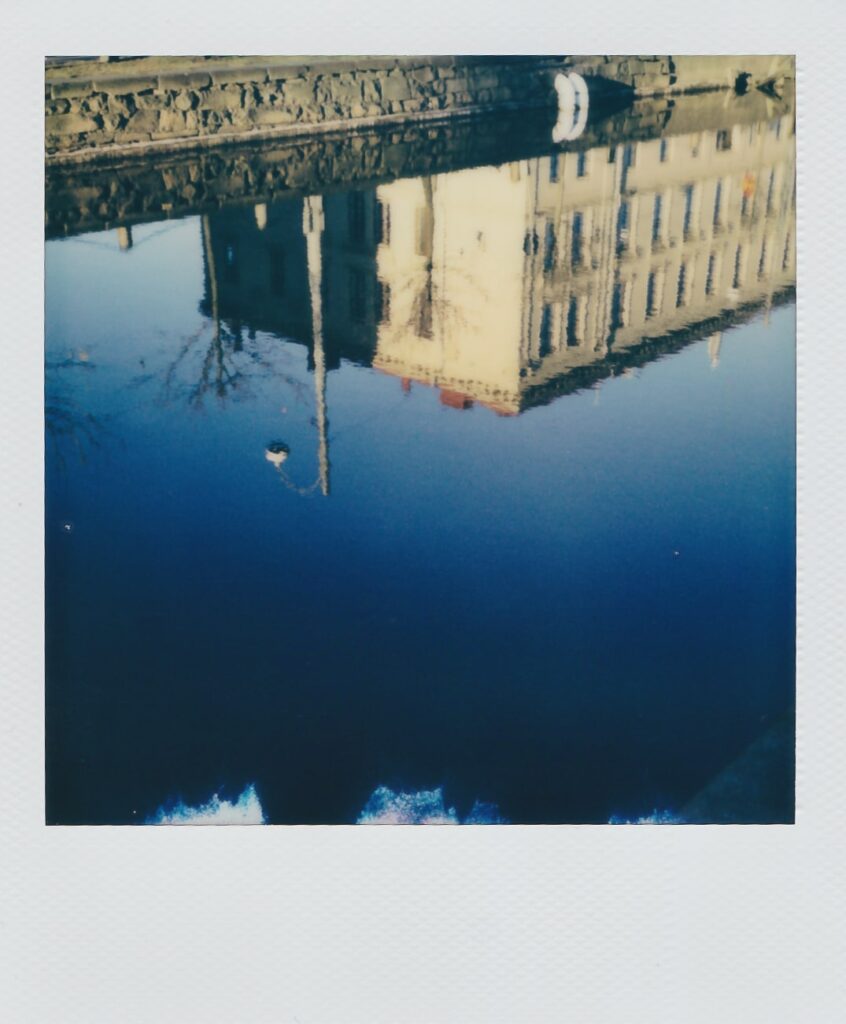
Stenpiren is one of Gothenburg’s hubs. Plenty of boats depart daily towards the Gothenburg archipelago, and it’s impressive to see the wide open sea. Moreover, the area looks gorgeous even though the constant wind is usually chilly. Straight at Stenpiren, there’s a monument for Swedish immigration in the 17th century to the USA. Its name is the Delaware Monument (Swedish: Delawaremonumentet). The sculpture in Gothenburg is a replica: the original one is at Fort Christina State Park in the USA.
On the sculpture’s top, you’ll see a boat and several symbolic themes around it. I guess I was too ambitious when shooting a polaroid with the SX-70. The light was harsh, and I wanted to include as much as possible. Anyway, here’s the photo.
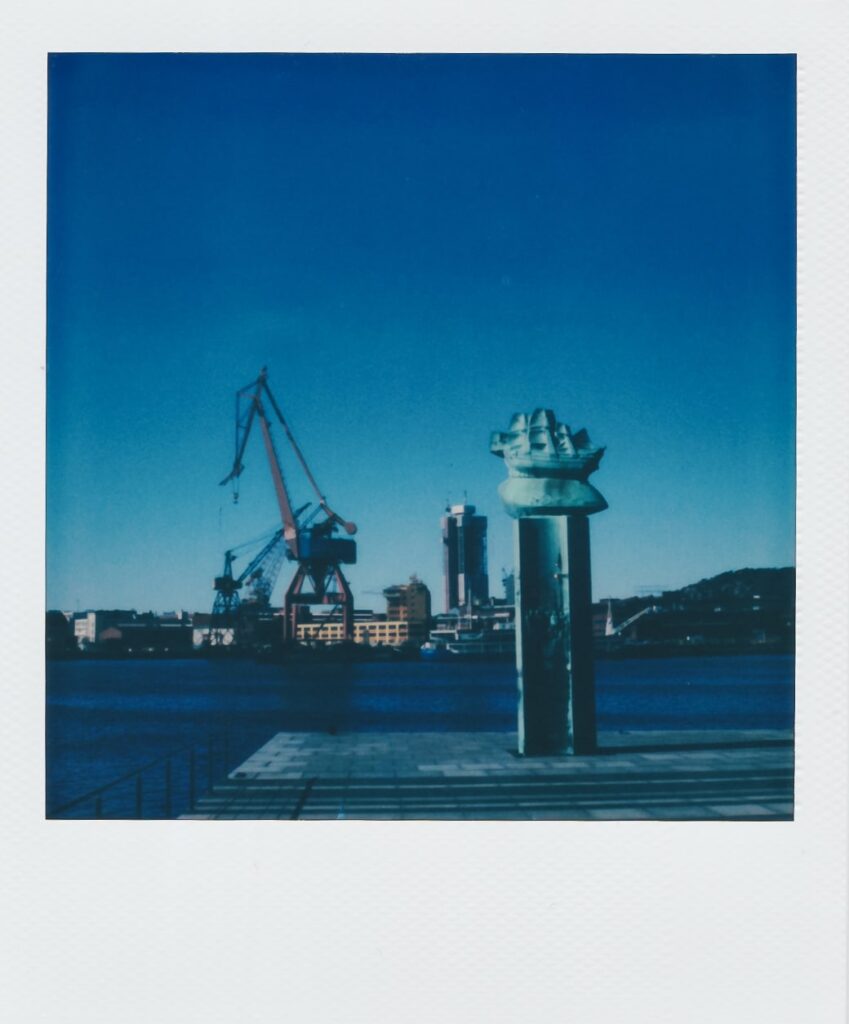
Close to Stenpiren, you can also see one of the most iconic examples of Gothenburg architecture. The so-called Lilla Bommen is named after the homonymous area (Lilla Bommen) and was erected in 1989. The impressive building is 86 m tall (282 ft), has 22 floors, and has offices and networking spaces. The locals call it “The Lipstick” because of its white and red colors. As you can easily imagine, the view from the top is breathtaking.
As for the boat next to it, that’s Barken Viking. This is the largest sailing ship in Scandinavia and was decommissioned in the 1950s. Nowadays it is a hotel and restaurant. Barken Viking is a four-masted steel bark constructed in 1906. You can see the prices and availability here if you’d like to stay overnight.
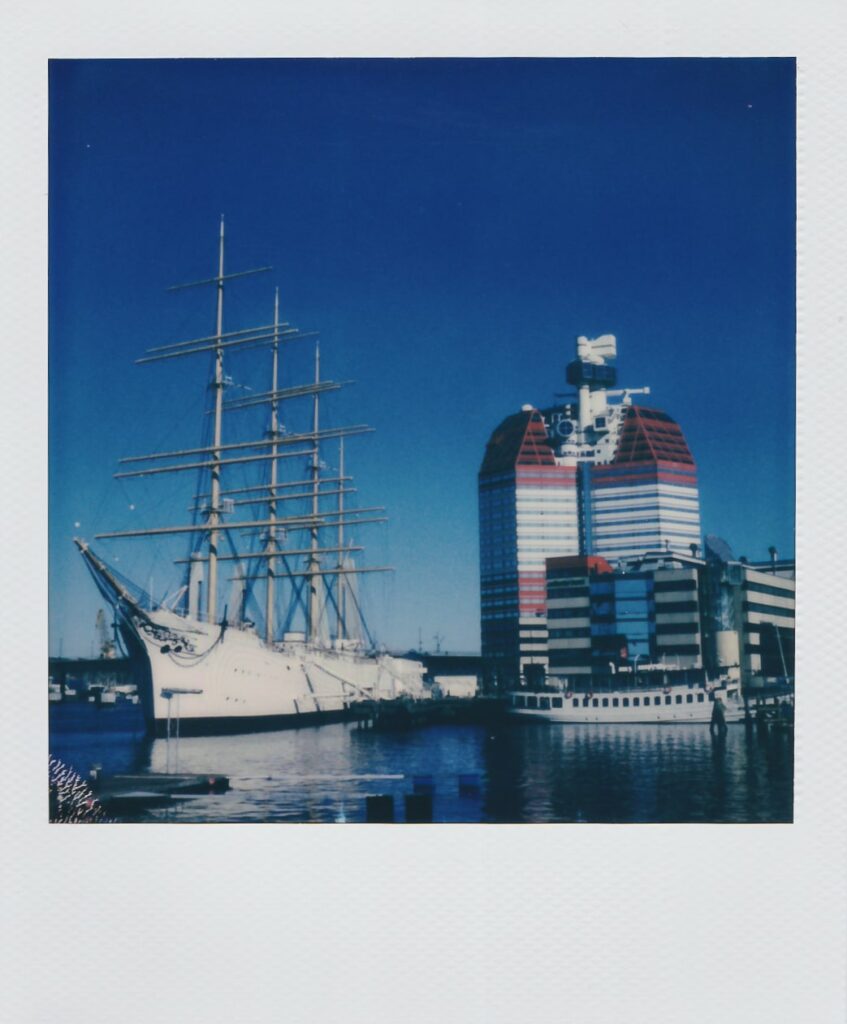
Evert Taube (1890-1976) was one of the most famous citizens of Gothenburg. He was an author, singer, artist, and composer. He has his spot at the city’s port, and the statue simultaneously seems melancholic and dreamy. In 2013, Google dedicated a doodle to Evert Taube. The Evert Taube statue is one of the best I’ve seen in Gothenburg.
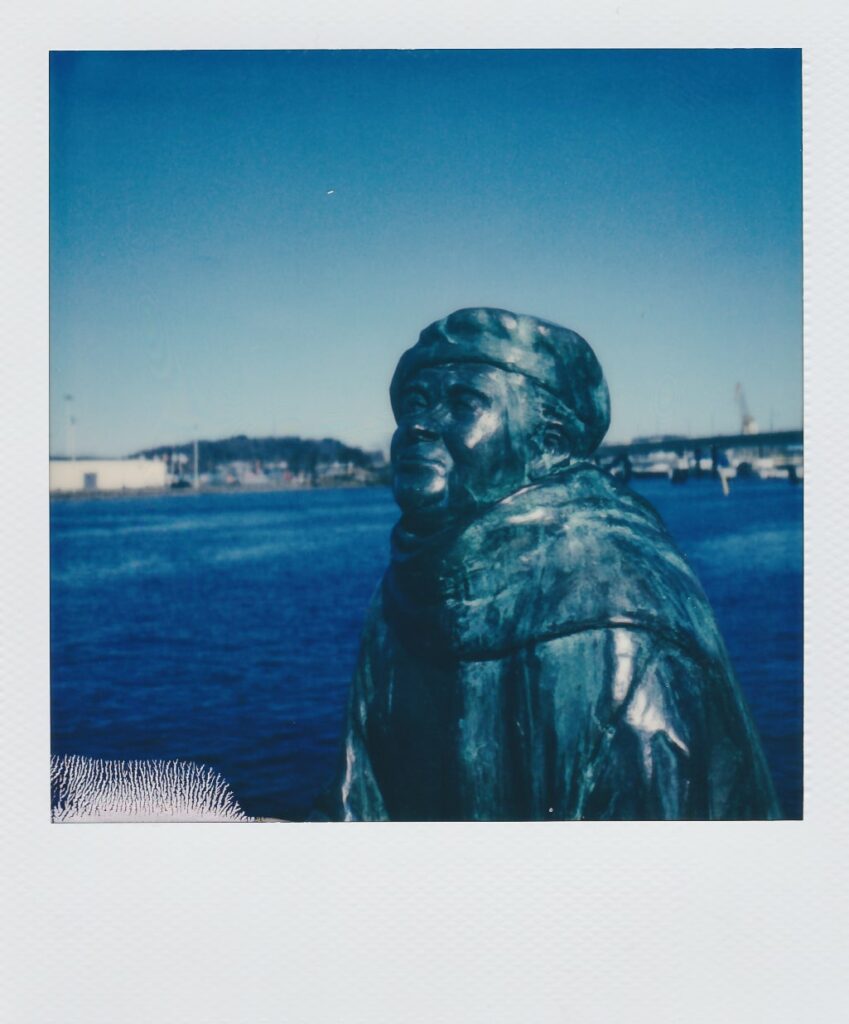
I talked earlier about the river’s presence in the city’s life, and the truth is that I couldn’t have enough of it. One late afternoon, I saw some buildings washed in warm light. Of course, shooting a polaroid of the scene would mean I’d have to choose: highlights or shadows? I decided to make the building pop instead of having some shadowy water. That said, while the river Göta is in front of me, you can’t see much. But the buildings and the bridge look really good.
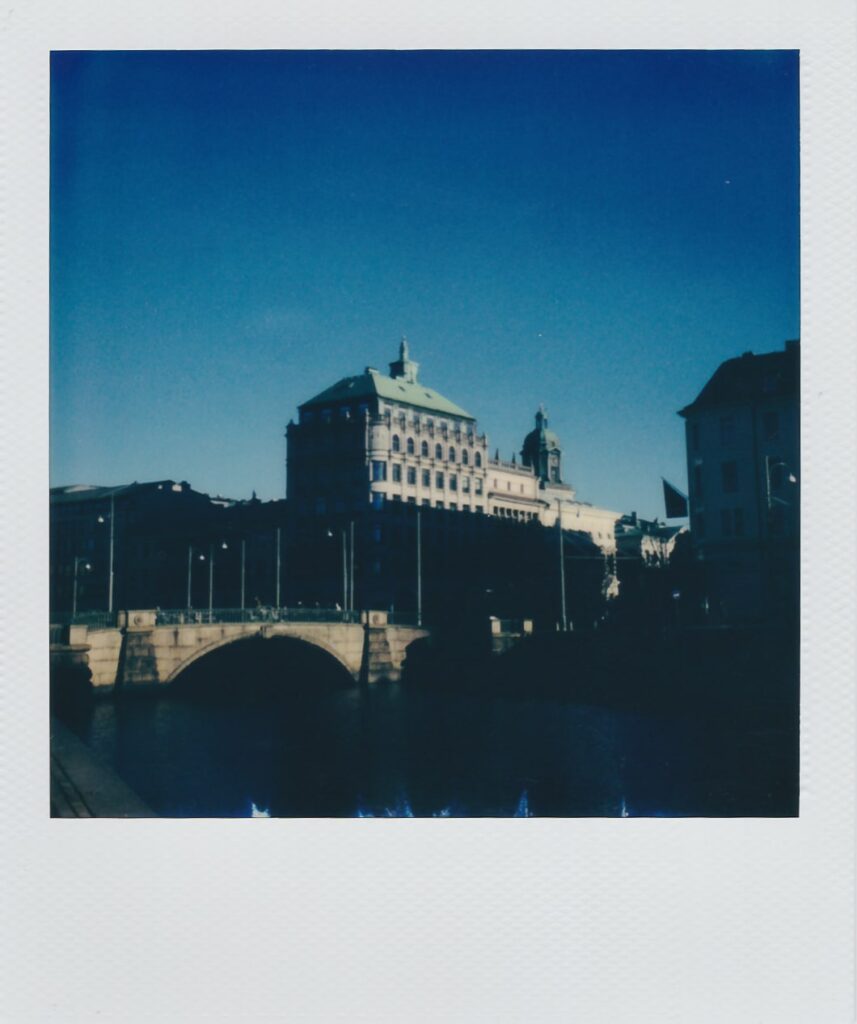
I had two shots left on the film, and I decided to split them: one for a Gothenburg statue and the other for an architectural location. The first photo is of the Charles Felix Lindberg statue. Charles Felix Lindberg was a famous 19th-century businessman who ran a shipping company. After he died, he donated a significant amount of money to the city. His statue is on the edge of Avenyn boulevard, and the SX-70 handled the portrait well.
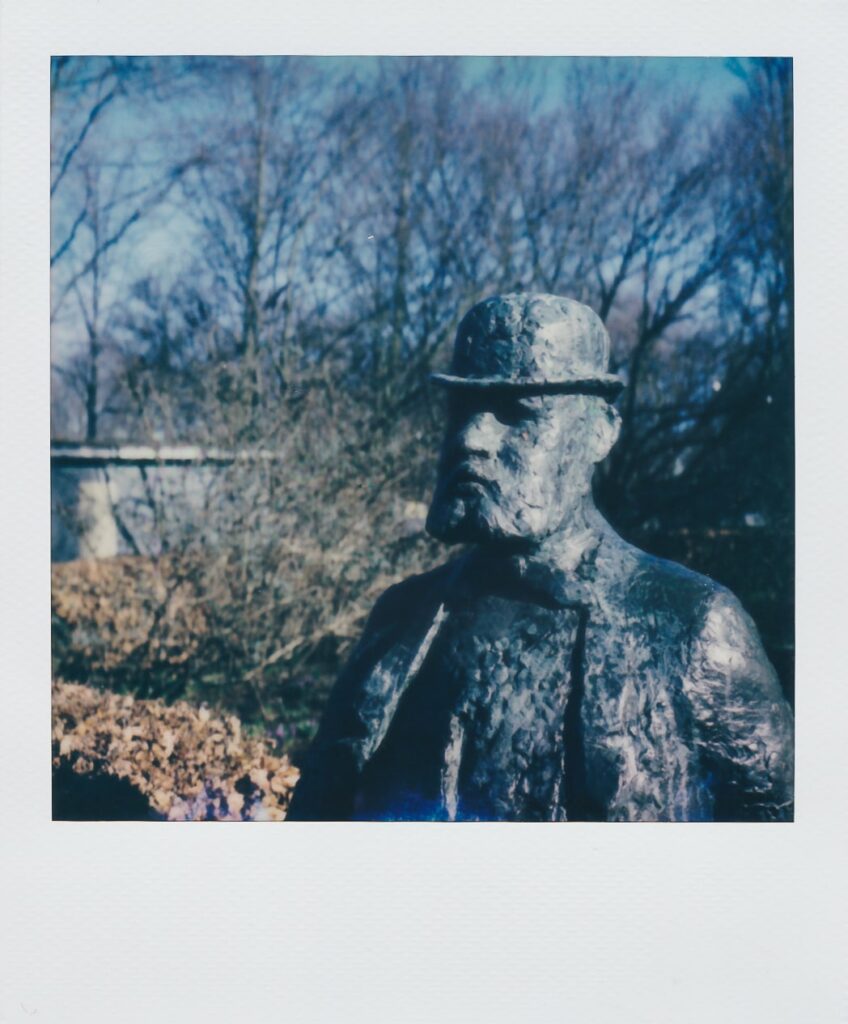
Finally, the last photo of this polaroid diary is about the stunning Älvsborg Bridge (Swedish: Älvsborgsbron). Constructed in 1966 and designed by Sven Olof Asplund, the bridge has a length of 933 meters. As you can imagine, this is one of the most iconic landmarks of Gothenburg. It is really impressive when you see it up close, and that’s why I probably made my most amateurish mistake.
Despite the sun, it was cold in Gothenburg that day, and I forgot to place the polaroid in an inner pocket. You know what that means: blue/green tint all over the image because it failed to develop in proper conditions. Although the tint gives an eerie atmosphere to the photo, I’d love to have a polaroid without it. What a way to celebrate the 20th edition of the Polaroid Diaries, though.

My Polaroid SX-70 settings for this diary
As always, I added a short section about the SX-70 settings I used while shooting the film.
As I stated in my SX-70 review, the camera is very intuitive. However, when I arrived in Gothenburg, I was impressed by the light’s harshness. I avoided shooting polaroids on the first day and tried to see how my Ricoh would behave. Soon, I decided to underexpose the photos slightly.
That said, in the photos you saw above, the exposure wheel is 1/3 towards darkness. However, I wasn’t always pleased with the result. For example, the Delaware Monument appears relatively dark, and the sky almost covers everything. On the other hand, the close-up shots look good, and I find the colors satisfying. However, I’m not convinced that if I kept the exposure wheel in the middle, it would be better. Actually, I’m afraid I’d have blown out highlights.
Of course, it would be ideal for shooting photos late in the afternoon. But that’s what makes travel photography with a polaroid camera challenging: visiting a place for a few days makes it hard to see every location within an ideal timeframe.
The reflection was the only photo I shot with the exposure wheel in the middle. This is the only late afternoon shot of this Polaroid Diary, and of course, the light was perfect. I even considered slight overexposing (by +1/3), but I’m glad I didn’t. The photo looks great as it is.
And that’s it with the 20th edition of the Polaroid Diaries and the Gothenburg statues & architecture photos with the Polaroid SX-70. Don’t forget to subscribe to the mailing list below if you want to see more polaroids, camera reviews, and tips. And check out my Polaroid Zines.
*You can buy the newest (and freshest) films and Polaroid cameras directly at Polaroid’s official websites.*
The US Store | The EU store | The UK Store
**If there’s no availability on the official stores, search for second-hand SX70s on Amazon.
More Polaroids: The complete Polaroid diaries
More Gothenburg: City guide, The Museum of Art, My travelogue, Hotel Royal
Polaroid Camera reviews: My Now+ review, Polaroid OneStep+ review & Polaroid GO review
Pin it for later
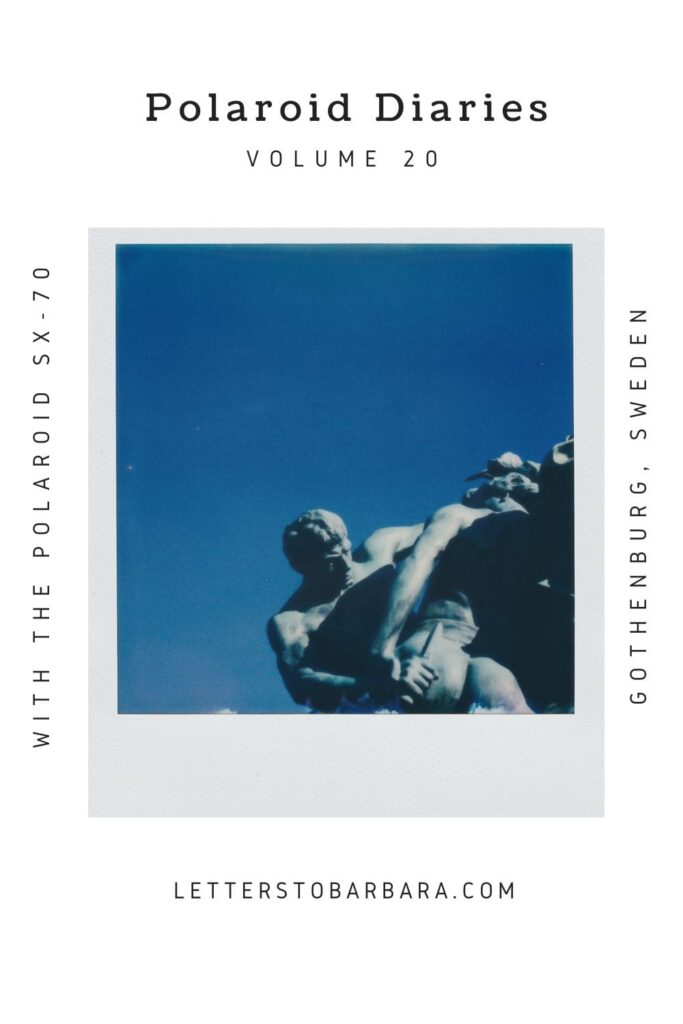
Sharing is caring. Share on FB or Twitter the Polaroid Diaries: Gothenburg statues & architecture (SX-70).
Last Updated on August 13, 2022 by George Pavlopoulos

